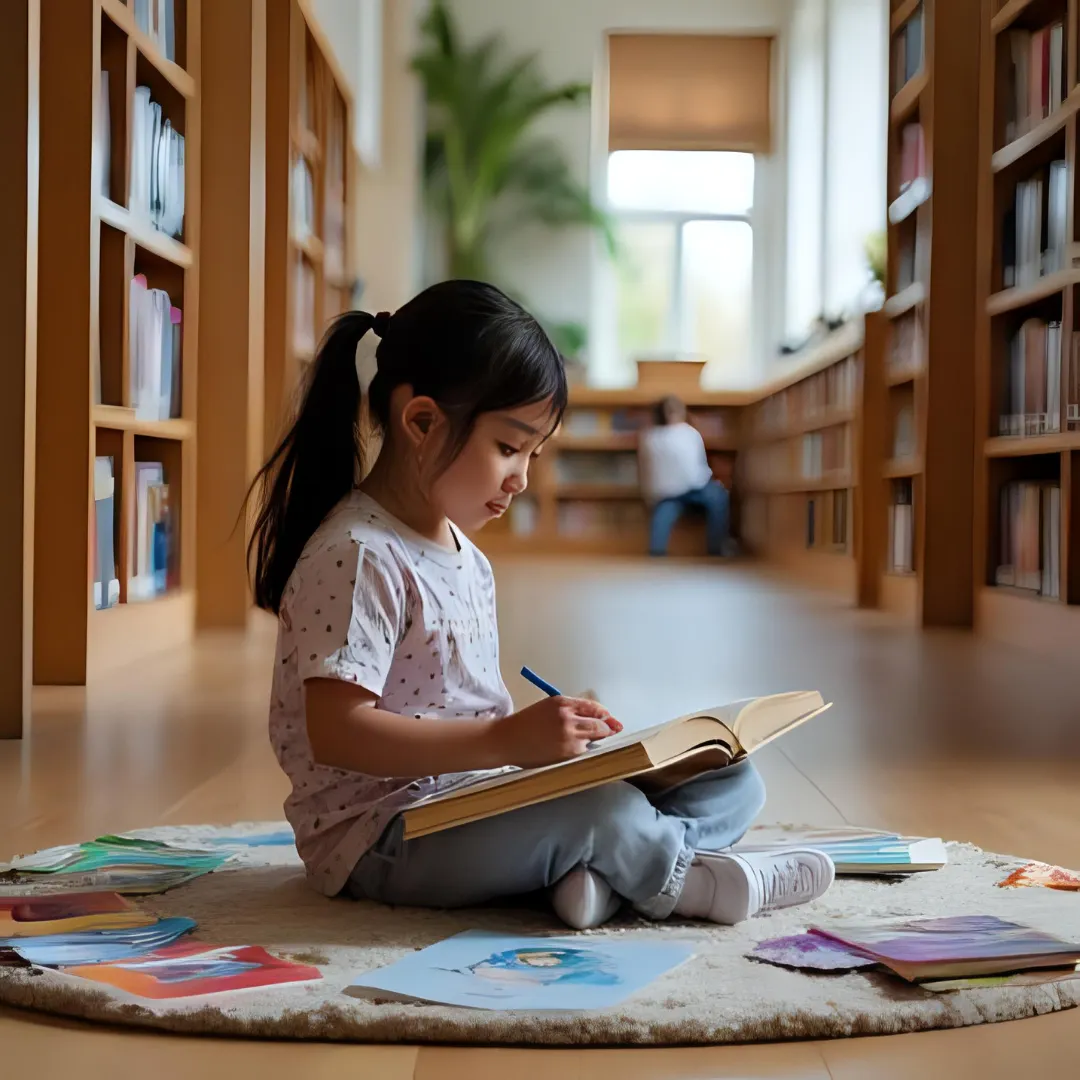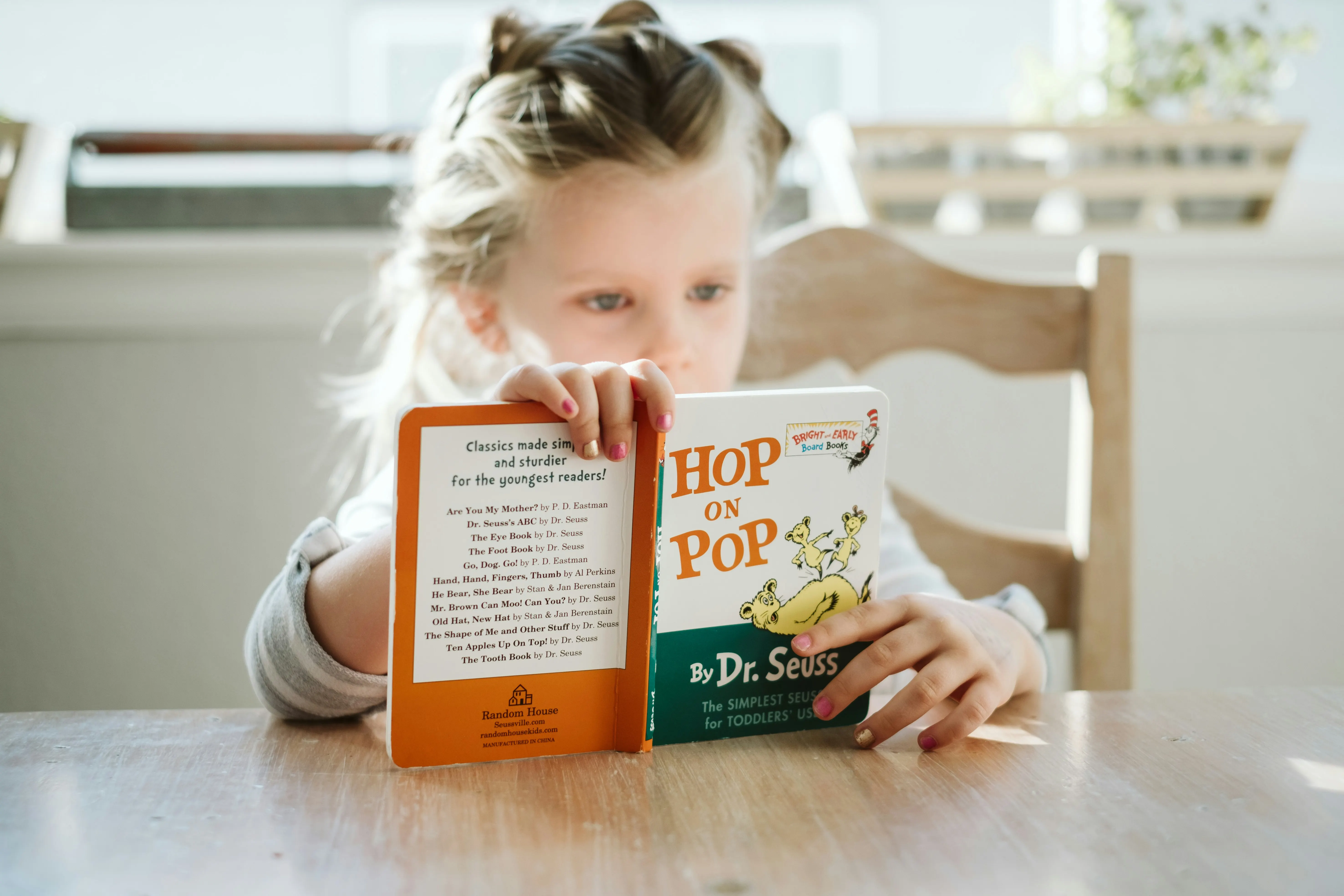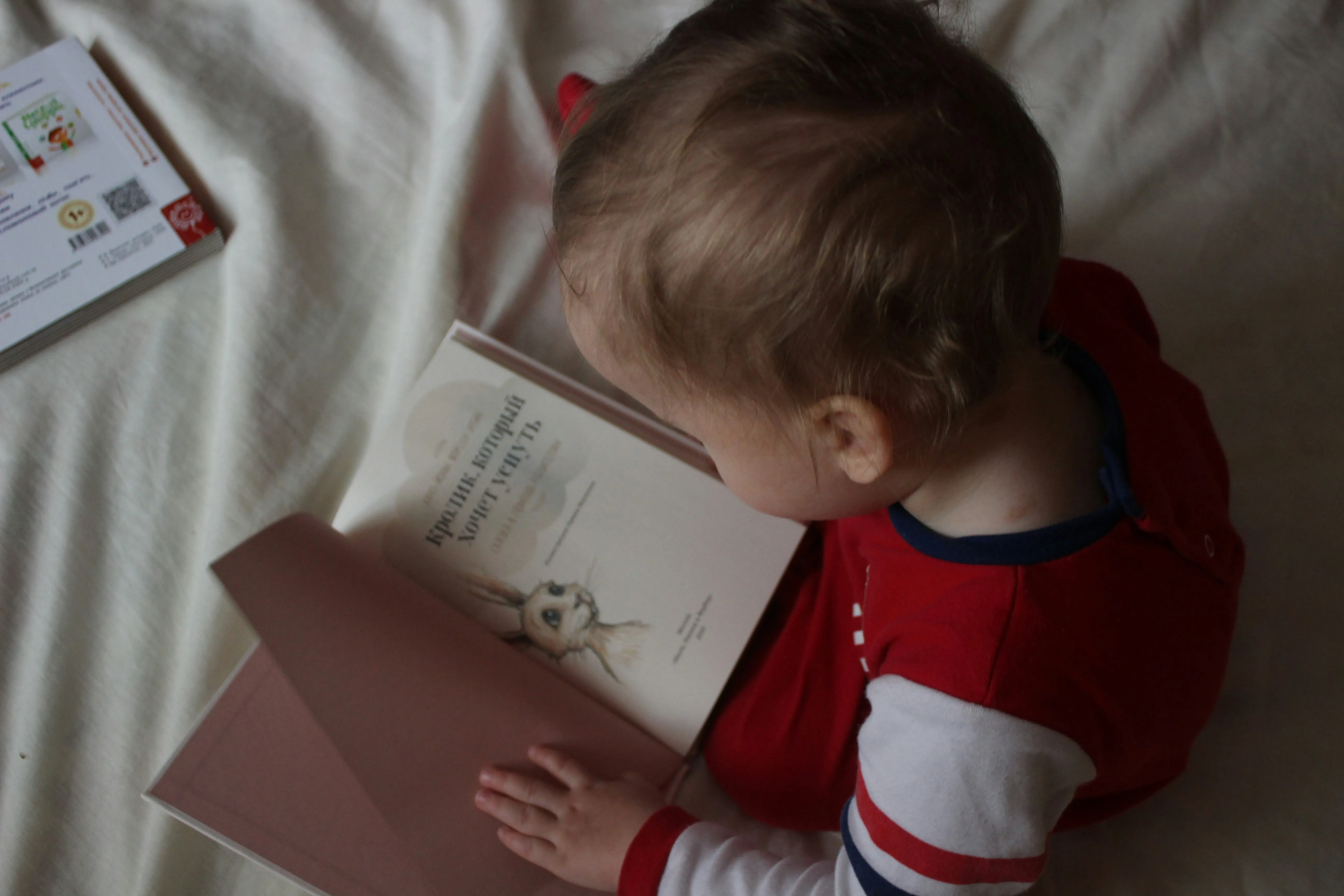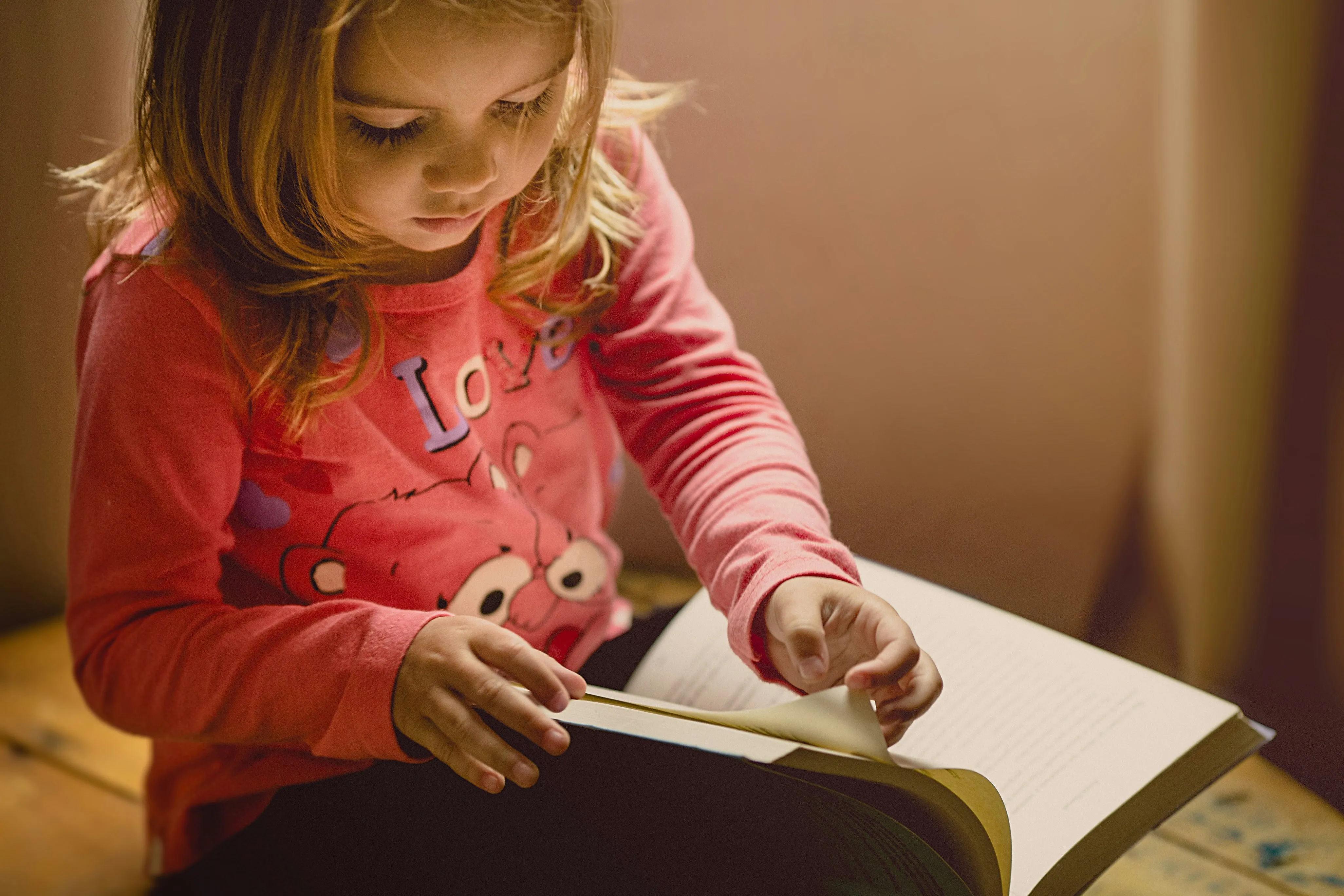Boost Brain Development: Benefits of Reading to Children
Enhance Brain Development Through Daily Reading
Key Highlights
- Daily reading significantly contributes to a child's cognitive development, enhancing language skills and critical thinking.
- Establishing a daily reading routine from a young age fosters a love for reading and supports emotional development.
- Creating a reading-friendly environment and selecting age-appropriate books are crucial for nurturing young readers.
- Balancing screen time with reading time is essential in today's digital age.
- Reading aloud to children strengthens bonds and offers numerous cognitive and emotional benefits.
Introduction
In a time where screens are everywhere and distractions are common, it's very important to help children love reading. Scheduling daily reading time from a young age can really help their brain development. This can lead to a lifelong passion for learning. This article looks at the strong link between reading and brain development. It offers tips and ideas to help parents raise children who enjoy reading.
The Science Behind Reading and Brain Development
 Reading plays a crucial role in developing young minds. It helps build brain connections and activates parts of the brain that handle language understanding, memory, and creativity. Reading goes beyond just recognizing words; it is a complex brain activity that strengthens this neural network.
Reading plays a crucial role in developing young minds. It helps build brain connections and activates parts of the brain that handle language understanding, memory, and creativity. Reading goes beyond just recognizing words; it is a complex brain activity that strengthens this neural network.
When kids read, their brains decode language, picture scenes, and link words to what they mean. This detailed process boosts their thinking skills, increases focus, and enhances their ability to learn in general.
How Reading Affects Neural Connections
Reading is a very strong tool for shaping a child’s brain. It helps create and strengthen connections in their brains. As babies grow, their experiences lead to the formation of new neural connections. Reading gives them a special chance to build more connections in areas related to language.
When reading, different parts of the brain are active. This includes parts that help with seeing, understanding language, and memory. As children learn letters, recognize words, and grasp sentences, these brain areas become even stronger, which supports cognitive development.
Regular reading helps these connections to be used often. The more they are used, the stronger and faster they become. This improved connection helps build important cognitive skills like critical thinking, problem-solving, and creativity.
The Role of Reading in Cognitive Development
Reading is very important for a child's brain and helps their thinking skills grow. It does more than just teach new words. Reading helps kids learn how to form sentences and use grammar. This helps them express themselves clearly and effectively.
Also, reading often helps kids think critically. They learn to look at characters, guess what might happen next, and see things from other people's perspectives. By interacting with stories, they get better at analyzing things. Plus, reading introduces kids to fresh ideas, different concepts, and new cultures, which broadens their view of the world.
Age-by-Age Guide to Encouraging Reading Habits
Encouraging good reading habits should start in infancy. This helps create a lasting love for books. Parents and teachers can make reading experiences fit a child’s growth stage. By doing this, they can help children enjoy and connect with reading. A personalized method that considers each stage of growth is important. It makes reading fun and valuable for children of all ages.
See our article on even earlier development: Prenatal Reading
Early Years (0-3): Laying the Foundation
In the early years (0-3), reading to children every day is very important. It helps develop their thinking skills. Including reading in your daily routine at this young age boosts their language skills and supports early literacy. It also helps with their emotional and social growth. When children look at books and participate in dialogic reading, they not only learn new words but also get better at understanding what they read. This practice is key for them to become independent readers later on and helps create a love of reading.
Preschool to Kindergarten (4-5): Fostering a Love for Reading
Spark your child's love for reading by spending time each day reading together. During the preschool to kindergarten years, diving into books helps kids learn to appreciate reading. Share stories with different characters, fun plots, and interactive storytelling. When you explore various topics in children's books, you support their social skills and thinking. Start introducing chapter books to encourage independent reading. This time is very important for creating a lasting love for reading. It helps them do well in school and feel happy.
Strategies for Integrating Reading into Daily Life
 Bringing reading into everyday life is important for helping young readers grow. Simple and easy strategies can turn any moment into a chance to enjoy books. It’s key to make reading a fun family activity instead of a task. This helps develop a real love for stories and learning.
Bringing reading into everyday life is important for helping young readers grow. Simple and easy strategies can turn any moment into a chance to enjoy books. It’s key to make reading a fun family activity instead of a task. This helps develop a real love for stories and learning.
Creating a Reading-Friendly Environment at Home
Creating a reading-friendly space at home does not mean you need to change everything. Simple steps can help a lot! Set up a cozy reading corner filled with books that are right for their age.
Having books within reach helps a young child explore reading by themselves. Make reading a part of your daily routine. Evenings are a good time to relax with a nice book. Encourage a "family reading hour," where everyone can enjoy their own stories.
When kids see their parents or siblings reading for fun, it makes reading feel important. Most importantly, let your child catch you enjoying a book!
Choosing the Right Books for Different Age Groups
Choosing the right books for kids is very important. It helps keep them interested and motivated. Younger kids like bright picture books with simple stories and characters they can relate to.
- As they get older, start giving them chapter books that have more complex stories and different characters. This can help improve their vocabulary and comprehension skills.
- Support their interests by looking at different genres, like fantasy, science fiction, historical fiction, and biographies. This will spark their curiosity and help them grow a love of reading.
The main aim is to help kids enjoy reading. If they don’t like a book, don’t make them read it. Let them explore various genres and authors until they discover what they like.

The Impact of Digital Media on Reading and Brain Development
Technology provides many ways to learn. However, kids today face both good and bad effects from digital media. Too much time on screens can hurt sleep, attention, and even brain development, especially in young children.
It's important to find a good balance between screen time and reading real books. When kids read physical books, they tend to focus better and understand more than when they read digitally. Parents and teachers need to help children use digital media wisely. They should encourage kids to choose helpful content rather than just passively consuming what they see.
Balancing Screen Time with Reading Time
In our digital world, children spend a lot of time on screens. But it's really important to find a good balance between screen time and reading time. This balance helps with their thinking skills and emotional development. Setting clear limits on screen time is key. This gives kids more chances to do independent reading.
You can help children focus on reading by creating set times for both screens and books. For instance, having a "no screens during meals" rule can lead to family talks. Also, encourage reading before bed. This can help children relax and sleep better.
At the same time, technology should be used to help with reading, not to replace it. You can use educational apps, audiobooks, and online libraries to encourage a love for stories and learning in different ways.
E-books vs. Traditional Books: Pros and Cons
The debate surrounding e-books versus traditional print books continues. Both media offer distinct advantages and disadvantages. E-books provide convenience and portability, while print books offer a tangible, sensory experience that many find more immersive. Ultimately, the best choice depends on the individual child's preferences and learning style.
E-books can be particularly appealing to reluctant readers due to features like adjustable font sizes and integrated dictionaries, which can support comprehension and make the reading process less daunting. However, research suggests that the tactile experience of holding a print book, turning pages, and feeling the paper contributes to deeper comprehension and retention.
Benefits of Reading to Children and Their Cognitive and Emotional Development
Reading out loud to kids, even when they are very young, has many benefits for their thinking and feelings. When kids listen to stories, their imaginations grow. This helps them be creative and learn more about the world around them. They also learn new vocabulary and ways to use language. This supports their language skills and sets the stage for learning to read.
In addition to helping them think better, reading together makes the connection between the reader and the child stronger. It gives them a shared time that feels warm and safe, building their emotional development. Talking about the themes, characters, and feelings in the stories helps kids grow empathy and social skills. This prepares them to handle relationships and understand what other people feel and experience.
Role of Parents and Teachers in Encouraging Reading
Parents and teachers are very important in helping kids love reading. When they make reading enjoyable, kids can develop a passion for books that lasts a long time. It's important to have lots of books around, offer interesting materials, and show that reading is fun.
Also, adding reading to daily routines, having specific reading time, and talking about books helps kids see reading as something they enjoy. Celebrating when they reach reading goals, going to libraries and bookstores together, and joining book clubs can help kids grow their love for reading.
Diverse Methods of Reading: Storytelling, Songs, and Use of Libraries
Cultivating a love for reading is not just about traditional books. You can engage children through storytelling, songs, and visits to the library. Storytelling sparks their imagination and shows them different cultures and views. Songs help improve their understanding of sounds and rhythm.
Libraries are like magical doors to a world of stories. They have many books and resources for everyone. Visiting the library regularly creates a feeling of community. It gives children access to different reading materials and inspires them to try new genres and authors.
Practical Tips for Sharing Books and Reading with Children
Creating positive and fun reading experiences begins when you share the activity. Instead of rushing through, take time to enjoy the story. Use different voices for each character. Ask your child questions about what’s happening and the pictures, and connect the story to their life.
Pick books together that match your child’s interests to make reading even more engaging. Include reading in your daily routine, whether it’s snuggling up for a bedtime story or carving out time for independent reading. Most importantly, let your child see you read and enjoy books too. Kids learn by watching and copying, so showing a love for reading is very important.
Emotional Resilience Through Daily Reading
Reading is not just good for the mind; it also helps kids grow emotionally. It gives them ways to deal with hard feelings and understand how others feel. Through stories, kids can feel many emotions like happiness, excitement, sadness, and fear without living them directly.
This experience helps them become more caring, understand their feelings better, and stay strong when facing challenges. By meeting different characters and seeing various stories, kids learn how to solve problems, use coping methods, and know why it is important to ask for help.

Role of Daily Reading Routines in Stress Reduction for Parents and Children
Creating a calming bedtime routine that includes reading is a great way to relax after a busy day. When you read aloud together in a comfy space, it helps both kids and parents feel more relaxed. This can decrease anxiety and create a feeling of happiness.
Reading aloud can lower heart rates and ease tension in the body. This helps both minds and bodies get ready for a good night's sleep. When parents are calm and engaged during reading time, children learn important skills to manage their emotions better.
Integrating Cultural Diversity in Daily Reads
Integrating books that showcase different cultures into daily reading helps children see a variety of viewpoints and experiences. Choosing stories with characters from diverse backgrounds and traditions helps kids understand more about the world. It also encourages openness and acceptance.
These stories can help kids develop empathy. They also challenge old stereotypes and teach them to value the wide range of human diversity. When picking out books, find those that are true to life and written by authors or illustrators from those cultures. This choice makes sure the characters and ideas are portrayed accurately and respectfully, giving real insights into different lifestyles.
Daily Reading to Support Kindergarten Readiness
Daily reading is very important for getting ready for kindergarten. It helps children gain key skills to do well in a school setting. When children read books often, they learn important literacy skills. These skills include understanding sounds, recognizing print, and letter recognition. These abilities help them become good readers in the future.
Reading every day also helps children with understanding stories, finding new words, and thinking critically. These skills prepare them to read harder books and understand complex ideas. By encouraging a love for reading from a young age, parents and caregivers give children a strong base for a successful school journey.
Morning vs. Nighttime Reading Benefits
Reading in the morning and at night has special benefits for children’s thinking and feelings. Adding reading to morning routines can help them focus, improve their mood, and start the day positively. These morning reading sessions can be quick and involve chatting about the story, which helps them share knowledge.
At night, reading can help kids relax, lessen worry, and give them a feeling of safety before bed. When adults read gentle stories in calm voices, it makes bedtime easier and helps them sleep well.
The Importance of Reading in Early Childhood
Reading is really important in early childhood. During these early years, children’s brains are growing quickly. They make connections that help them learn later on. Reading early helps kids develop language skills, think better, and grow socially and emotionally.
When infants and toddlers hear books and stories, it creates a fun way to learn. Listening to read-alouds, nursery rhymes, and songs helps kids feel good about reading. It sparks their imagination and helps them learn new words. The more words children hear early on, the more ready they will be for academic success and learning throughout their lives.
The Role of Storytelling and Songs Beyond Reading
Storytelling and singing are important for language development and reading skills, even before kids learn to read. These activities help improve listening skills, grow vocabulary, and boost memory and understanding. Traditional stories, myths, and fables often teach lessons and share cultural values, showing a wide range of human experiences.
Singing helps kids develop phonemic awareness. This means they learn to hear and change sounds in words. This skill is key for figuring out words and connecting spoken and written language. Plus, the rhythm and repetition in songs make it a fun way for children to learn new words and ideas.
Reading in Diverse Languages and Its Impact
Reading in different languages can help the brain, especially in children. When kids learn new languages, it helps them think more flexibly, remember better, and improves their focus. It's a good idea to start teaching a second language early.
People who can speak more than one language often think more flexibly. They can solve problems better and communicate well with others. As the world connects more, knowing multiple languages is a useful skill.
The Connection Between Reading and Academic Success
The link between reading and doing well in school is clear. Kids who become great readers do better in all their subjects. Reading improves vocabulary, understanding, thinking skills, and communication. These skills help them in many different areas.
Students who read often gain more knowledge. They get better at understanding information and improve their writing and speaking skills, which are key for success in school. So, encouraging a love of reading from a young age is an important way to invest in a child’s future in academics.
How to Use Libraries to Enhance Reading Habits
Libraries are great places for learning. They have a lot of resources and programs to capture the interest of young people. Going to the library regularly helps kids love reading. It gives them access to many books, magazines, and digital tools. Libraries also create a sense of community. They offer a friendly space to explore, discover, and meet other reading fans.
Many libraries run storytelling sessions, book clubs, and author events for kids and teens. These fun programs help kids enjoy reading. They also give chances to meet new friends and build a lasting love for books.
Selecting Age-Appropriate Books for Children
Choosing the right books for your child is important for helping them love reading. For younger kids, pick board books that have bright colors, simple stories, and repeating text. As kids get older, start showing them picture books with fun illustrations and more detailed stories.
Think about what your child likes when picking books. If they love animals, dinosaurs, or space, there is a book that will grab their attention. Let them explore different types of books and writers.
Early Bilingual Advantages
Research shows that being bilingual from a young age is good for the brain. Kids who learn two languages early tend to be better at thinking flexibly, remembering things, and solving problems. Learning more than one language helps the brain's executive functions. These functions deal with attention, planning, and multitasking.
Also, being bilingual early helps kids understand and appreciate different cultures. They learn about various languages, traditions, and views. This helps them see the world in a broader way and improves their communication skills.
Reading as a Gateway to Discussing Children's Mental Health
Children's literature can be a great way to talk about mental health. Books that discuss feelings like empathy, sadness, anxiety, and self-esteem help kids understand these emotions better. When children read about characters with similar problems, it can make them feel less alone and more open about their feelings.
Parents and teachers can use these stories to start conversations that are right for the child's age. This can help children learn how to express their feelings and cope with tough situations. It’s very important to create a safe space where kids feel okay sharing their emotions and asking for help when they need it.
Long-Term Career Benefits of Daily Reading
Reading every day, especially from a young age, brings lasting benefits for your career that go beyond just school achievements. People who read well usually communicate better. They also have stronger critical thinking skills and more empathy, which are all important traits in today’s job market.
Those who read a lot are good at learning new things. They quickly understand different ideas and gather knowledge effectively. Reading various types of literature also helps them become more aware of different cultures, which is an important skill in our connected world.
Technology Integration in Daily Reading
While regular books are very important, using technology wisely can improve reading every day. Educational apps, audiobooks, and online libraries offer fun ways for kids to enjoy stories. For example, audiobooks help kids who learn by listening, making long drives more fun.
Still, we need to find a good balance and not get rid of real books. Technology should support and add to reading, not take its place. It’s good to encourage kids to use both types for a complete reading experience.
The Role of Daily Reading in Developing Critical Thinking
Daily reading helps build critical thinking, which is a key skill in our complex world. It encourages kids to look at information carefully, consider different viewpoints, and develop their ideas. When they engage with stories, children learn to understand why characters act in certain ways, guess what might happen next, and see connections between events.
This active involvement improves their understanding, boosts their analytical skills, and encourages them to think for themselves. Also, reading a variety of genres and writing styles helps widen their perspectives. It prepares kids to tackle challenges with creativity and careful thinking.
Conclusion
Reading is more than just a hobby; it is a good exercise for your brain. When you read daily, you help your brain make strong connections. This improves your thinking skills and helps you handle your feelings better. Parents and teachers are important in encouraging kids to read early on. This builds a lasting love for books.
Reading can happen in the morning or at night. It can be through storytelling or learning new languages. Each reading time helps with school success and thinking skills. So, begin your reading adventure today and tell us about your experiences in the comments. Let’s create a community that values daily reading.
Related Articles :
Vocabulary Power: Opening the Door to Reading Success
Tales, Teaching, and Tiny Voices: The Power of Early Narrative Skill
Reading Development with Read-Alouds
Frequently Asked Questions
How Early Should I Start Reading to My Child?
Before birth! A baby can hear and process sounds and rhythm at week 16 to 18. See our article here: Prenatal Reading Development
You can begin reading to your child when they are just a baby! Very young children gain a lot from hearing your voice. They learn new words and get to know books. Reading out loud, even in your home language, helps develop important literacy skills.
Can Reading Aloud Help in Brain Development?
Reading aloud to children, even before they can read, greatly helps in their cognitive development. When they listen to stories, it builds their vocabulary and comprehension skills. This process also ignites their imagination.
What Types of Books Stimulate Brain Development?
Picture books that have bright pictures, interesting stories, and easy-to-understand words help young readers develop their brains. When children read about different topics, types of stories, and writing styles, it also makes their literacy skills better.
How Can I Make Reading a Habit for My Child?
To make reading a habit, set a daily reading time. Create a cozy spot for reading. Let your young child pick books that they really like. Reading aloud together is a great opportunity. It helps show a love for books in the right way.

Written with Augmented Intelligence and SHiNER The Human







































































































































